Influence of Culture, Politics and Power on Behaviour in Tesco Plc
VerifiedAdded on 2023/01/19
|16
|5025
|69
AI Summary
This document analyzes the influence of organizational culture, politics, and power on the behavior and performance of individuals and teams in Tesco Plc. It discusses the impact of culture on performance, the effects of politics on behavior, and the role of power in team and individual performance. The document also evaluates motivational theories and concepts and provides recommendations for improving the relationship between culture, politics, and power in the organization.
Contribute Materials
Your contribution can guide someone’s learning journey. Share your
documents today.
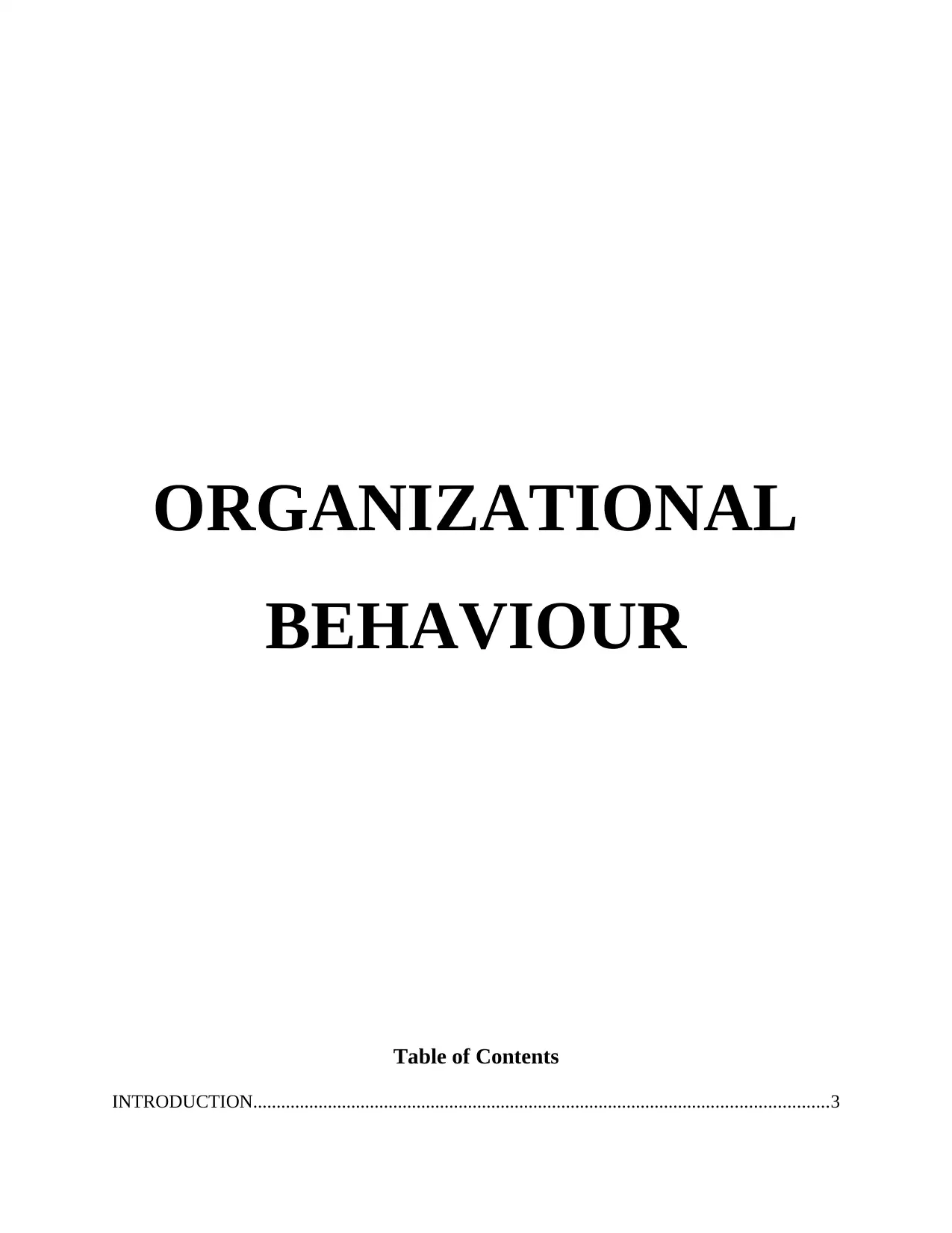
ORGANIZATIONAL
BEHAVIOUR
Table of Contents
INTRODUCTION...........................................................................................................................3
BEHAVIOUR
Table of Contents
INTRODUCTION...........................................................................................................................3
Secure Best Marks with AI Grader
Need help grading? Try our AI Grader for instant feedback on your assignments.
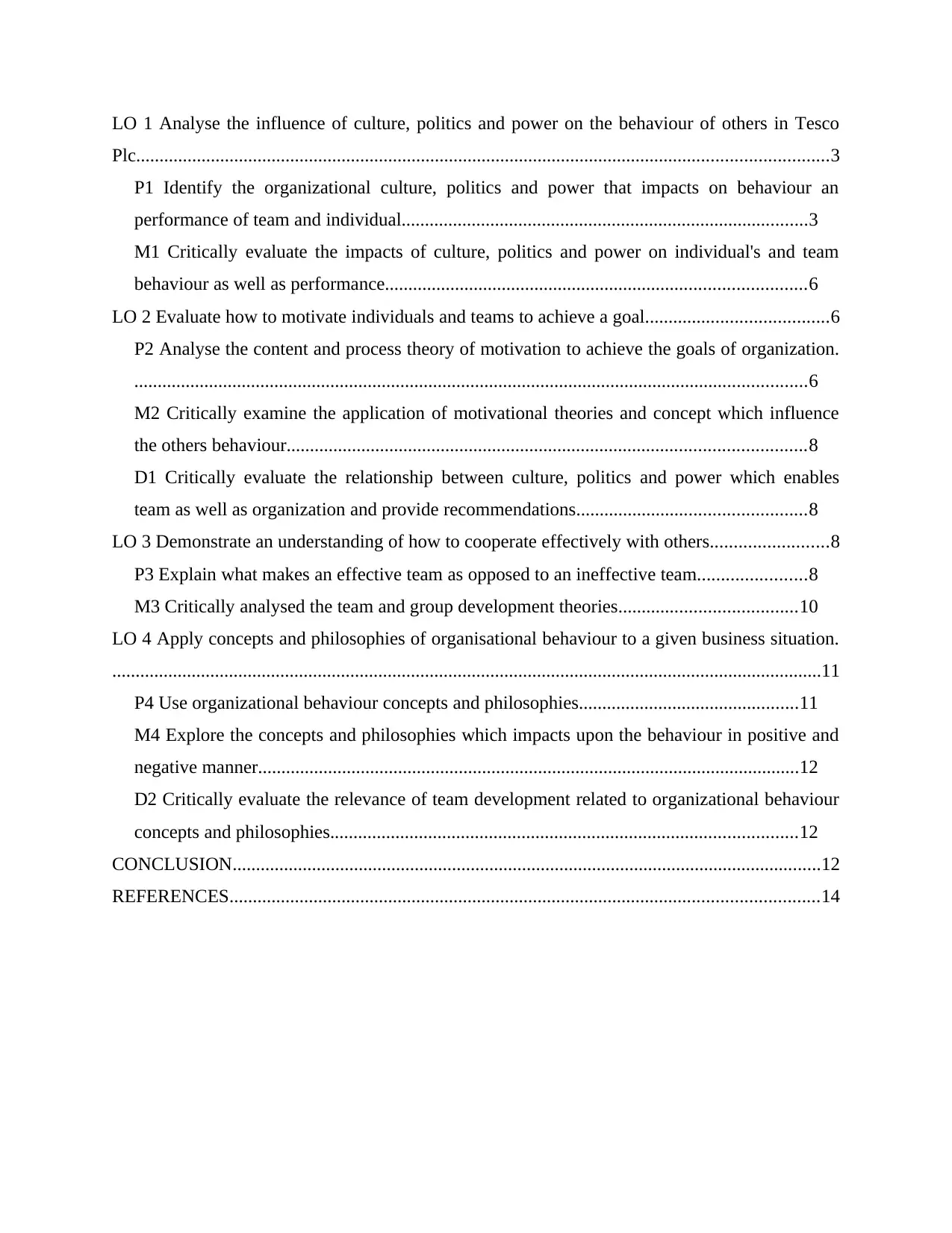
LO 1 Analyse the influence of culture, politics and power on the behaviour of others in Tesco
Plc....................................................................................................................................................3
P1 Identify the organizational culture, politics and power that impacts on behaviour an
performance of team and individual.......................................................................................3
M1 Critically evaluate the impacts of culture, politics and power on individual's and team
behaviour as well as performance..........................................................................................6
LO 2 Evaluate how to motivate individuals and teams to achieve a goal.......................................6
P2 Analyse the content and process theory of motivation to achieve the goals of organization.
................................................................................................................................................6
M2 Critically examine the application of motivational theories and concept which influence
the others behaviour...............................................................................................................8
D1 Critically evaluate the relationship between culture, politics and power which enables
team as well as organization and provide recommendations.................................................8
LO 3 Demonstrate an understanding of how to cooperate effectively with others.........................8
P3 Explain what makes an effective team as opposed to an ineffective team.......................8
M3 Critically analysed the team and group development theories......................................10
LO 4 Apply concepts and philosophies of organisational behaviour to a given business situation.
........................................................................................................................................................11
P4 Use organizational behaviour concepts and philosophies...............................................11
M4 Explore the concepts and philosophies which impacts upon the behaviour in positive and
negative manner....................................................................................................................12
D2 Critically evaluate the relevance of team development related to organizational behaviour
concepts and philosophies....................................................................................................12
CONCLUSION..............................................................................................................................12
REFERENCES..............................................................................................................................14
Plc....................................................................................................................................................3
P1 Identify the organizational culture, politics and power that impacts on behaviour an
performance of team and individual.......................................................................................3
M1 Critically evaluate the impacts of culture, politics and power on individual's and team
behaviour as well as performance..........................................................................................6
LO 2 Evaluate how to motivate individuals and teams to achieve a goal.......................................6
P2 Analyse the content and process theory of motivation to achieve the goals of organization.
................................................................................................................................................6
M2 Critically examine the application of motivational theories and concept which influence
the others behaviour...............................................................................................................8
D1 Critically evaluate the relationship between culture, politics and power which enables
team as well as organization and provide recommendations.................................................8
LO 3 Demonstrate an understanding of how to cooperate effectively with others.........................8
P3 Explain what makes an effective team as opposed to an ineffective team.......................8
M3 Critically analysed the team and group development theories......................................10
LO 4 Apply concepts and philosophies of organisational behaviour to a given business situation.
........................................................................................................................................................11
P4 Use organizational behaviour concepts and philosophies...............................................11
M4 Explore the concepts and philosophies which impacts upon the behaviour in positive and
negative manner....................................................................................................................12
D2 Critically evaluate the relevance of team development related to organizational behaviour
concepts and philosophies....................................................................................................12
CONCLUSION..............................................................................................................................12
REFERENCES..............................................................................................................................14
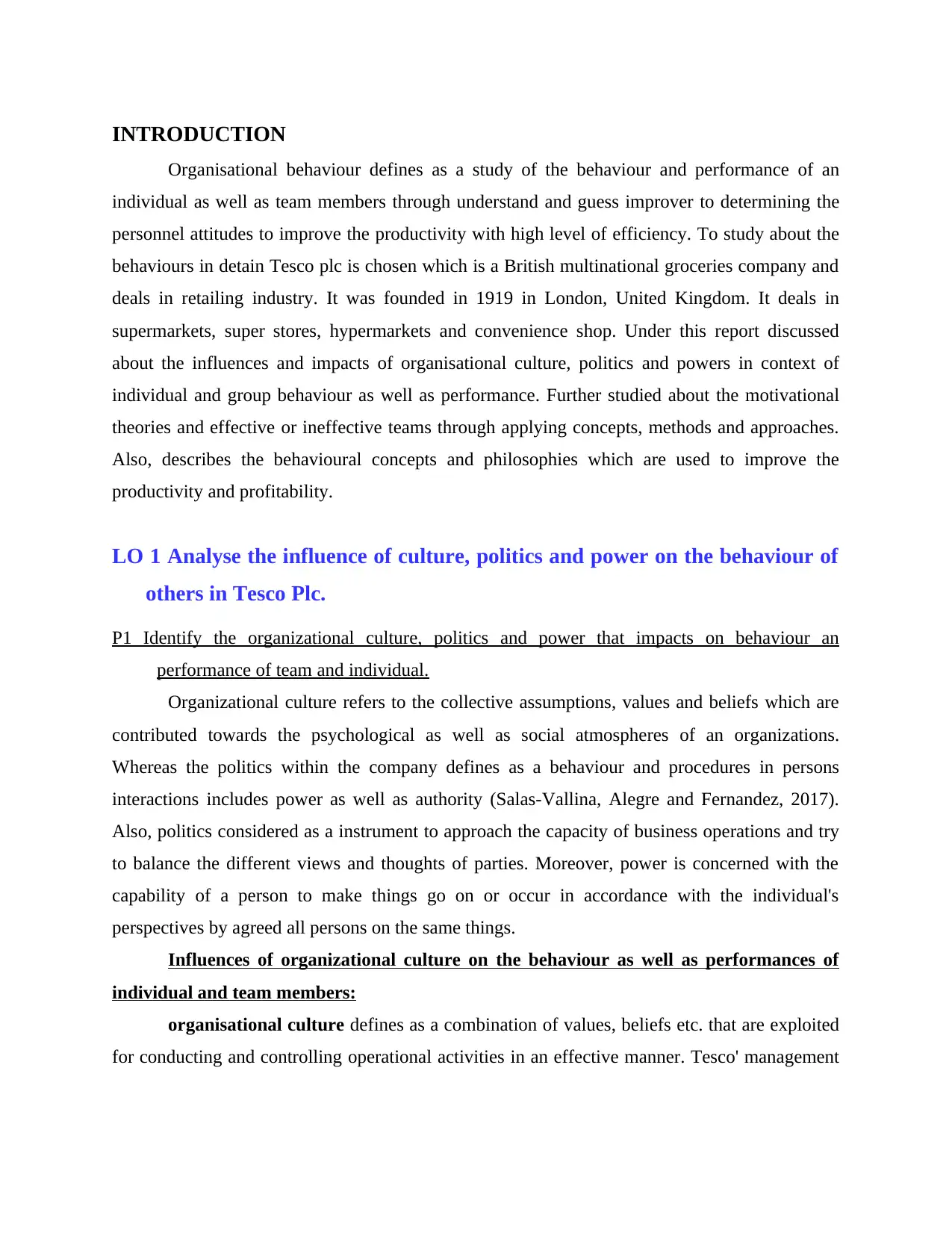
INTRODUCTION
Organisational behaviour defines as a study of the behaviour and performance of an
individual as well as team members through understand and guess improver to determining the
personnel attitudes to improve the productivity with high level of efficiency. To study about the
behaviours in detain Tesco plc is chosen which is a British multinational groceries company and
deals in retailing industry. It was founded in 1919 in London, United Kingdom. It deals in
supermarkets, super stores, hypermarkets and convenience shop. Under this report discussed
about the influences and impacts of organisational culture, politics and powers in context of
individual and group behaviour as well as performance. Further studied about the motivational
theories and effective or ineffective teams through applying concepts, methods and approaches.
Also, describes the behavioural concepts and philosophies which are used to improve the
productivity and profitability.
LO 1 Analyse the influence of culture, politics and power on the behaviour of
others in Tesco Plc.
P1 Identify the organizational culture, politics and power that impacts on behaviour an
performance of team and individual.
Organizational culture refers to the collective assumptions, values and beliefs which are
contributed towards the psychological as well as social atmospheres of an organizations.
Whereas the politics within the company defines as a behaviour and procedures in persons
interactions includes power as well as authority (Salas-Vallina, Alegre and Fernandez, 2017).
Also, politics considered as a instrument to approach the capacity of business operations and try
to balance the different views and thoughts of parties. Moreover, power is concerned with the
capability of a person to make things go on or occur in accordance with the individual's
perspectives by agreed all persons on the same things.
Influences of organizational culture on the behaviour as well as performances of
individual and team members:
organisational culture defines as a combination of values, beliefs etc. that are exploited
for conducting and controlling operational activities in an effective manner. Tesco' management
Organisational behaviour defines as a study of the behaviour and performance of an
individual as well as team members through understand and guess improver to determining the
personnel attitudes to improve the productivity with high level of efficiency. To study about the
behaviours in detain Tesco plc is chosen which is a British multinational groceries company and
deals in retailing industry. It was founded in 1919 in London, United Kingdom. It deals in
supermarkets, super stores, hypermarkets and convenience shop. Under this report discussed
about the influences and impacts of organisational culture, politics and powers in context of
individual and group behaviour as well as performance. Further studied about the motivational
theories and effective or ineffective teams through applying concepts, methods and approaches.
Also, describes the behavioural concepts and philosophies which are used to improve the
productivity and profitability.
LO 1 Analyse the influence of culture, politics and power on the behaviour of
others in Tesco Plc.
P1 Identify the organizational culture, politics and power that impacts on behaviour an
performance of team and individual.
Organizational culture refers to the collective assumptions, values and beliefs which are
contributed towards the psychological as well as social atmospheres of an organizations.
Whereas the politics within the company defines as a behaviour and procedures in persons
interactions includes power as well as authority (Salas-Vallina, Alegre and Fernandez, 2017).
Also, politics considered as a instrument to approach the capacity of business operations and try
to balance the different views and thoughts of parties. Moreover, power is concerned with the
capability of a person to make things go on or occur in accordance with the individual's
perspectives by agreed all persons on the same things.
Influences of organizational culture on the behaviour as well as performances of
individual and team members:
organisational culture defines as a combination of values, beliefs etc. that are exploited
for conducting and controlling operational activities in an effective manner. Tesco' management
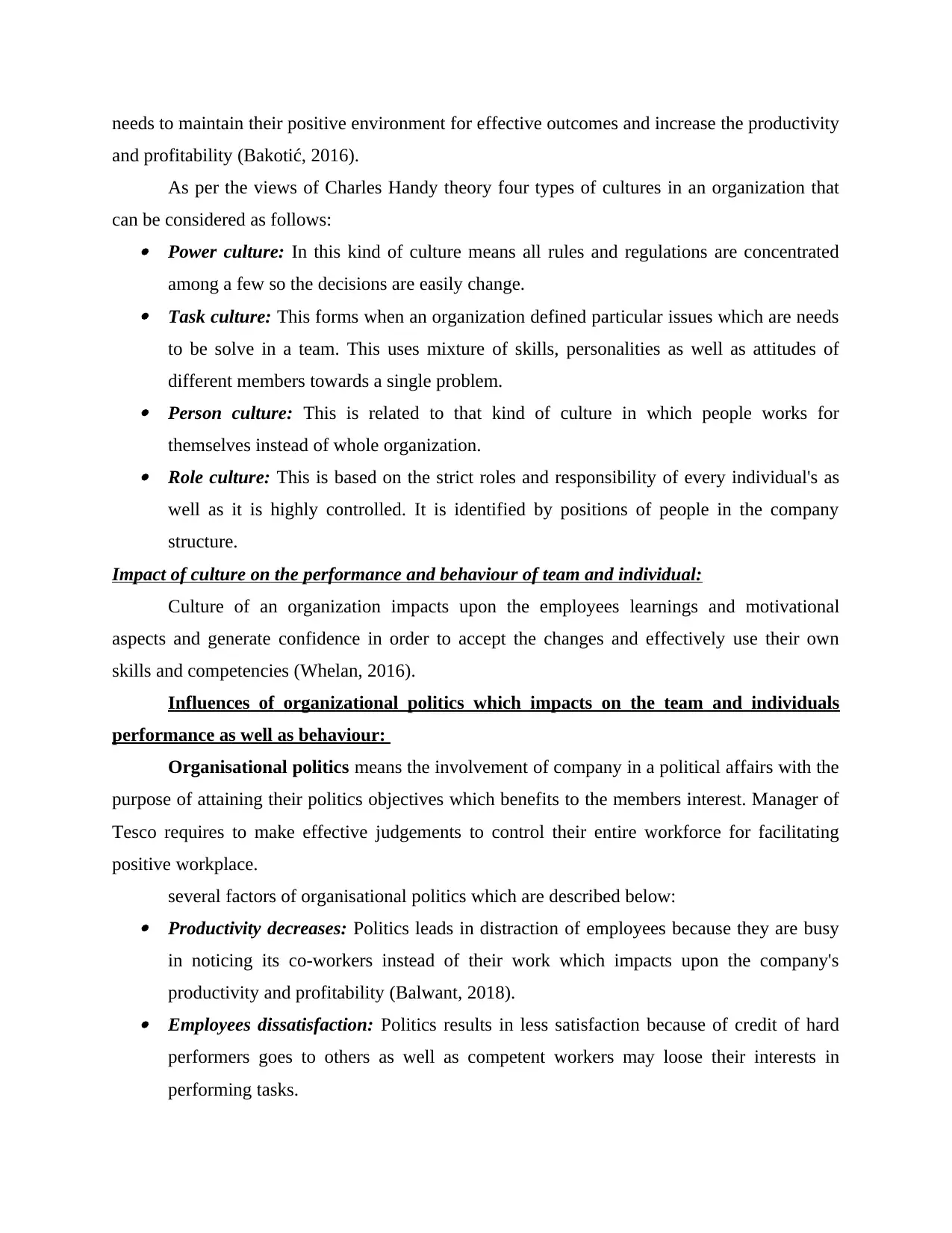
needs to maintain their positive environment for effective outcomes and increase the productivity
and profitability (Bakotić, 2016).
As per the views of Charles Handy theory four types of cultures in an organization that
can be considered as follows: Power culture: In this kind of culture means all rules and regulations are concentrated
among a few so the decisions are easily change. Task culture: This forms when an organization defined particular issues which are needs
to be solve in a team. This uses mixture of skills, personalities as well as attitudes of
different members towards a single problem. Person culture: This is related to that kind of culture in which people works for
themselves instead of whole organization. Role culture: This is based on the strict roles and responsibility of every individual's as
well as it is highly controlled. It is identified by positions of people in the company
structure.
Impact of culture on the performance and behaviour of team and individual:
Culture of an organization impacts upon the employees learnings and motivational
aspects and generate confidence in order to accept the changes and effectively use their own
skills and competencies (Whelan, 2016).
Influences of organizational politics which impacts on the team and individuals
performance as well as behaviour:
Organisational politics means the involvement of company in a political affairs with the
purpose of attaining their politics objectives which benefits to the members interest. Manager of
Tesco requires to make effective judgements to control their entire workforce for facilitating
positive workplace.
several factors of organisational politics which are described below: Productivity decreases: Politics leads in distraction of employees because they are busy
in noticing its co-workers instead of their work which impacts upon the company's
productivity and profitability (Balwant, 2018). Employees dissatisfaction: Politics results in less satisfaction because of credit of hard
performers goes to others as well as competent workers may loose their interests in
performing tasks.
and profitability (Bakotić, 2016).
As per the views of Charles Handy theory four types of cultures in an organization that
can be considered as follows: Power culture: In this kind of culture means all rules and regulations are concentrated
among a few so the decisions are easily change. Task culture: This forms when an organization defined particular issues which are needs
to be solve in a team. This uses mixture of skills, personalities as well as attitudes of
different members towards a single problem. Person culture: This is related to that kind of culture in which people works for
themselves instead of whole organization. Role culture: This is based on the strict roles and responsibility of every individual's as
well as it is highly controlled. It is identified by positions of people in the company
structure.
Impact of culture on the performance and behaviour of team and individual:
Culture of an organization impacts upon the employees learnings and motivational
aspects and generate confidence in order to accept the changes and effectively use their own
skills and competencies (Whelan, 2016).
Influences of organizational politics which impacts on the team and individuals
performance as well as behaviour:
Organisational politics means the involvement of company in a political affairs with the
purpose of attaining their politics objectives which benefits to the members interest. Manager of
Tesco requires to make effective judgements to control their entire workforce for facilitating
positive workplace.
several factors of organisational politics which are described below: Productivity decreases: Politics leads in distraction of employees because they are busy
in noticing its co-workers instead of their work which impacts upon the company's
productivity and profitability (Balwant, 2018). Employees dissatisfaction: Politics results in less satisfaction because of credit of hard
performers goes to others as well as competent workers may loose their interests in
performing tasks.
Secure Best Marks with AI Grader
Need help grading? Try our AI Grader for instant feedback on your assignments.
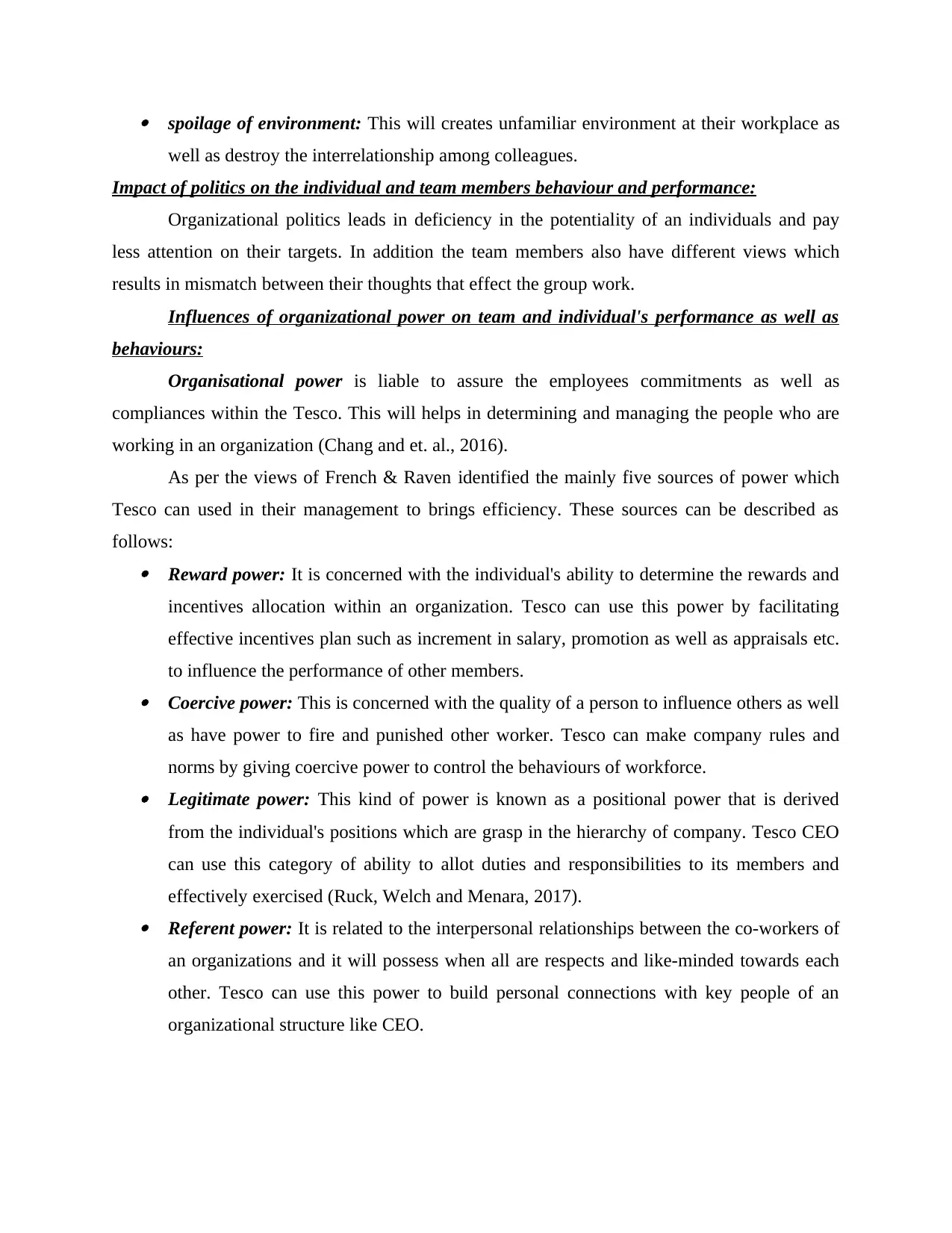
spoilage of environment: This will creates unfamiliar environment at their workplace as
well as destroy the interrelationship among colleagues.
Impact of politics on the individual and team members behaviour and performance:
Organizational politics leads in deficiency in the potentiality of an individuals and pay
less attention on their targets. In addition the team members also have different views which
results in mismatch between their thoughts that effect the group work.
Influences of organizational power on team and individual's performance as well as
behaviours:
Organisational power is liable to assure the employees commitments as well as
compliances within the Tesco. This will helps in determining and managing the people who are
working in an organization (Chang and et. al., 2016).
As per the views of French & Raven identified the mainly five sources of power which
Tesco can used in their management to brings efficiency. These sources can be described as
follows: Reward power: It is concerned with the individual's ability to determine the rewards and
incentives allocation within an organization. Tesco can use this power by facilitating
effective incentives plan such as increment in salary, promotion as well as appraisals etc.
to influence the performance of other members. Coercive power: This is concerned with the quality of a person to influence others as well
as have power to fire and punished other worker. Tesco can make company rules and
norms by giving coercive power to control the behaviours of workforce. Legitimate power: This kind of power is known as a positional power that is derived
from the individual's positions which are grasp in the hierarchy of company. Tesco CEO
can use this category of ability to allot duties and responsibilities to its members and
effectively exercised (Ruck, Welch and Menara, 2017). Referent power: It is related to the interpersonal relationships between the co-workers of
an organizations and it will possess when all are respects and like-minded towards each
other. Tesco can use this power to build personal connections with key people of an
organizational structure like CEO.
well as destroy the interrelationship among colleagues.
Impact of politics on the individual and team members behaviour and performance:
Organizational politics leads in deficiency in the potentiality of an individuals and pay
less attention on their targets. In addition the team members also have different views which
results in mismatch between their thoughts that effect the group work.
Influences of organizational power on team and individual's performance as well as
behaviours:
Organisational power is liable to assure the employees commitments as well as
compliances within the Tesco. This will helps in determining and managing the people who are
working in an organization (Chang and et. al., 2016).
As per the views of French & Raven identified the mainly five sources of power which
Tesco can used in their management to brings efficiency. These sources can be described as
follows: Reward power: It is concerned with the individual's ability to determine the rewards and
incentives allocation within an organization. Tesco can use this power by facilitating
effective incentives plan such as increment in salary, promotion as well as appraisals etc.
to influence the performance of other members. Coercive power: This is concerned with the quality of a person to influence others as well
as have power to fire and punished other worker. Tesco can make company rules and
norms by giving coercive power to control the behaviours of workforce. Legitimate power: This kind of power is known as a positional power that is derived
from the individual's positions which are grasp in the hierarchy of company. Tesco CEO
can use this category of ability to allot duties and responsibilities to its members and
effectively exercised (Ruck, Welch and Menara, 2017). Referent power: It is related to the interpersonal relationships between the co-workers of
an organizations and it will possess when all are respects and like-minded towards each
other. Tesco can use this power to build personal connections with key people of an
organizational structure like CEO.
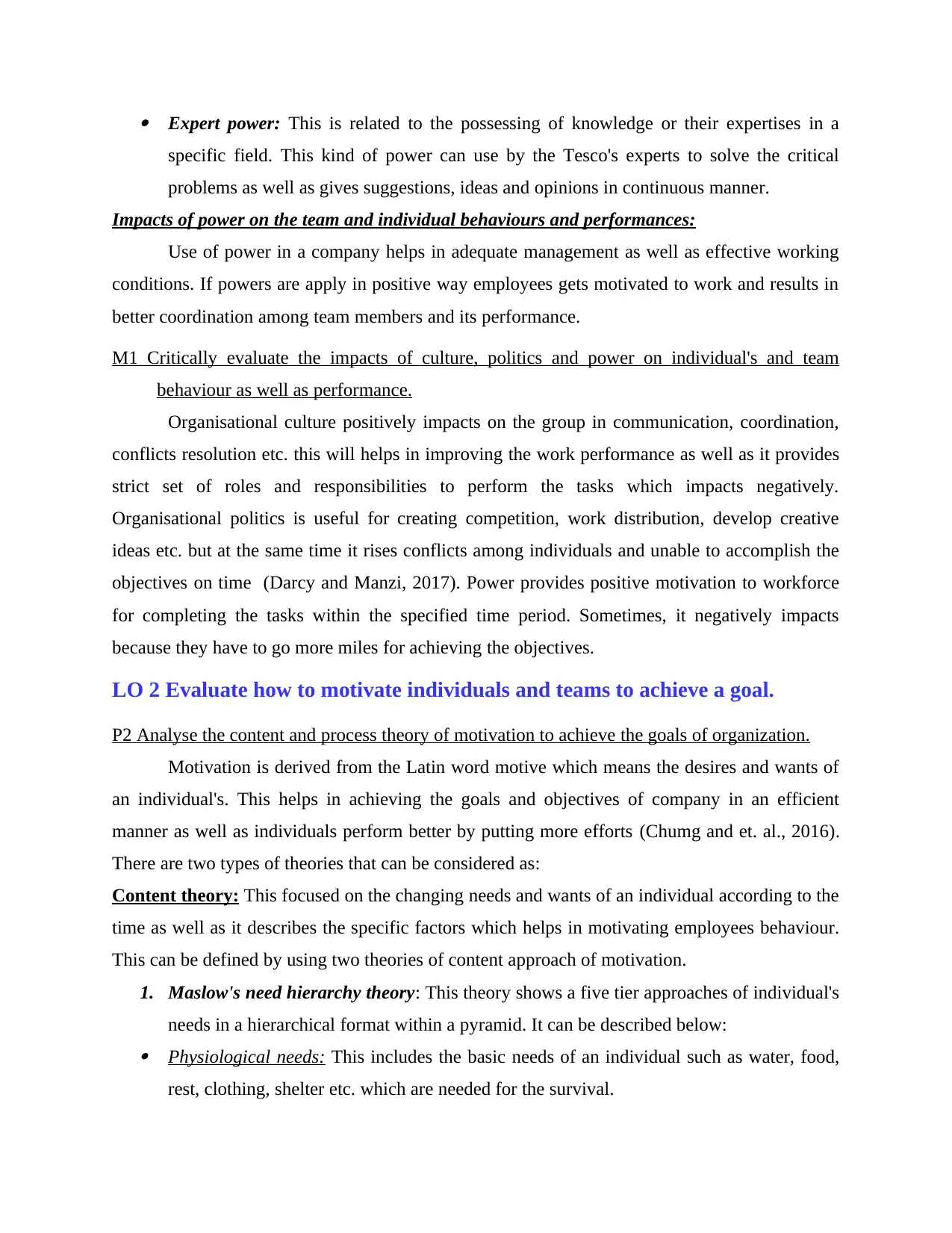
Expert power: This is related to the possessing of knowledge or their expertises in a
specific field. This kind of power can use by the Tesco's experts to solve the critical
problems as well as gives suggestions, ideas and opinions in continuous manner.
Impacts of power on the team and individual behaviours and performances:
Use of power in a company helps in adequate management as well as effective working
conditions. If powers are apply in positive way employees gets motivated to work and results in
better coordination among team members and its performance.
M1 Critically evaluate the impacts of culture, politics and power on individual's and team
behaviour as well as performance.
Organisational culture positively impacts on the group in communication, coordination,
conflicts resolution etc. this will helps in improving the work performance as well as it provides
strict set of roles and responsibilities to perform the tasks which impacts negatively.
Organisational politics is useful for creating competition, work distribution, develop creative
ideas etc. but at the same time it rises conflicts among individuals and unable to accomplish the
objectives on time (Darcy and Manzi, 2017). Power provides positive motivation to workforce
for completing the tasks within the specified time period. Sometimes, it negatively impacts
because they have to go more miles for achieving the objectives.
LO 2 Evaluate how to motivate individuals and teams to achieve a goal.
P2 Analyse the content and process theory of motivation to achieve the goals of organization.
Motivation is derived from the Latin word motive which means the desires and wants of
an individual's. This helps in achieving the goals and objectives of company in an efficient
manner as well as individuals perform better by putting more efforts (Chumg and et. al., 2016).
There are two types of theories that can be considered as:
Content theory: This focused on the changing needs and wants of an individual according to the
time as well as it describes the specific factors which helps in motivating employees behaviour.
This can be defined by using two theories of content approach of motivation.
1. Maslow's need hierarchy theory: This theory shows a five tier approaches of individual's
needs in a hierarchical format within a pyramid. It can be described below: Physiological needs: This includes the basic needs of an individual such as water, food,
rest, clothing, shelter etc. which are needed for the survival.
specific field. This kind of power can use by the Tesco's experts to solve the critical
problems as well as gives suggestions, ideas and opinions in continuous manner.
Impacts of power on the team and individual behaviours and performances:
Use of power in a company helps in adequate management as well as effective working
conditions. If powers are apply in positive way employees gets motivated to work and results in
better coordination among team members and its performance.
M1 Critically evaluate the impacts of culture, politics and power on individual's and team
behaviour as well as performance.
Organisational culture positively impacts on the group in communication, coordination,
conflicts resolution etc. this will helps in improving the work performance as well as it provides
strict set of roles and responsibilities to perform the tasks which impacts negatively.
Organisational politics is useful for creating competition, work distribution, develop creative
ideas etc. but at the same time it rises conflicts among individuals and unable to accomplish the
objectives on time (Darcy and Manzi, 2017). Power provides positive motivation to workforce
for completing the tasks within the specified time period. Sometimes, it negatively impacts
because they have to go more miles for achieving the objectives.
LO 2 Evaluate how to motivate individuals and teams to achieve a goal.
P2 Analyse the content and process theory of motivation to achieve the goals of organization.
Motivation is derived from the Latin word motive which means the desires and wants of
an individual's. This helps in achieving the goals and objectives of company in an efficient
manner as well as individuals perform better by putting more efforts (Chumg and et. al., 2016).
There are two types of theories that can be considered as:
Content theory: This focused on the changing needs and wants of an individual according to the
time as well as it describes the specific factors which helps in motivating employees behaviour.
This can be defined by using two theories of content approach of motivation.
1. Maslow's need hierarchy theory: This theory shows a five tier approaches of individual's
needs in a hierarchical format within a pyramid. It can be described below: Physiological needs: This includes the basic needs of an individual such as water, food,
rest, clothing, shelter etc. which are needed for the survival.
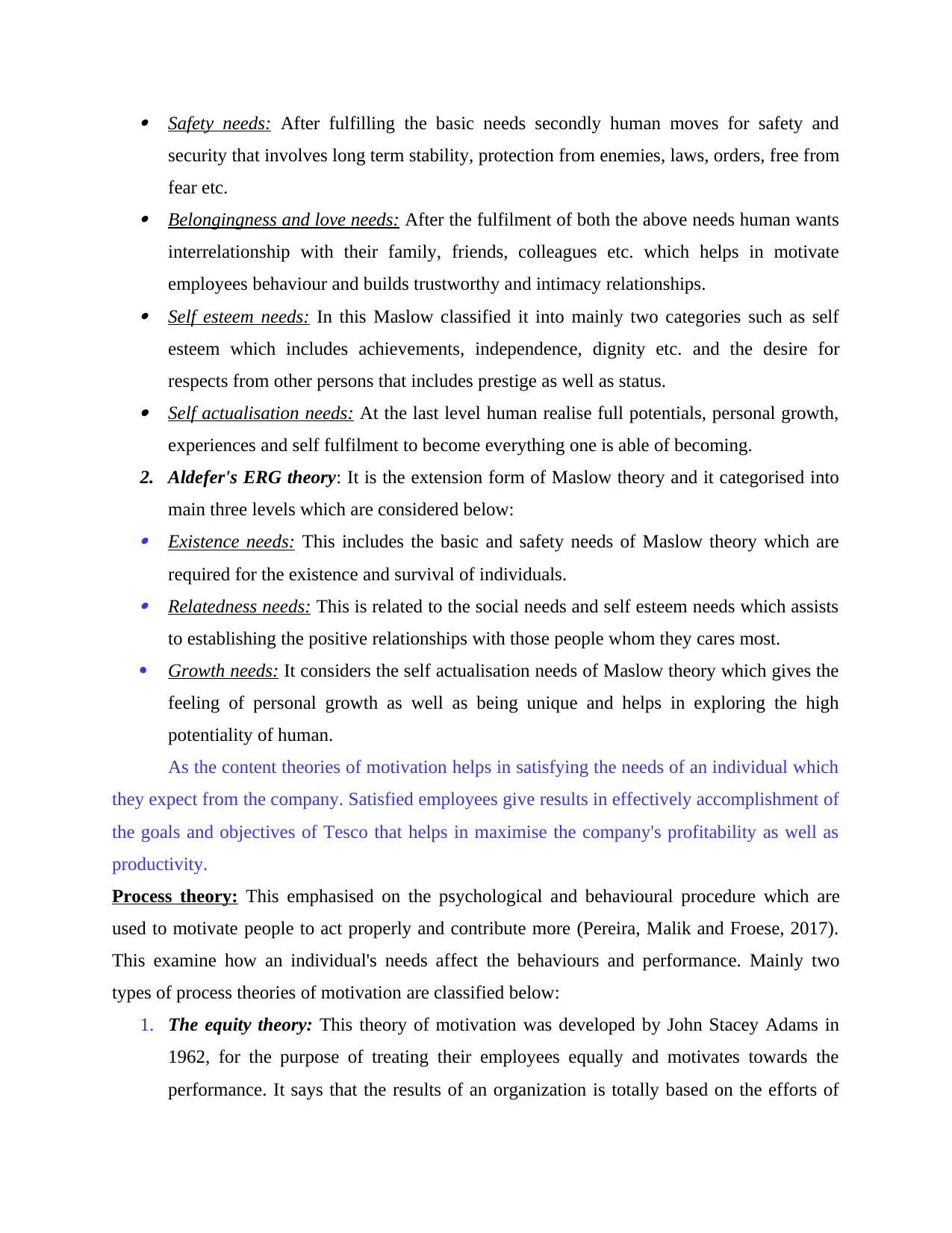
Safety needs: After fulfilling the basic needs secondly human moves for safety and
security that involves long term stability, protection from enemies, laws, orders, free from
fear etc. Belongingness and love needs: After the fulfilment of both the above needs human wants
interrelationship with their family, friends, colleagues etc. which helps in motivate
employees behaviour and builds trustworthy and intimacy relationships. Self esteem needs: In this Maslow classified it into mainly two categories such as self
esteem which includes achievements, independence, dignity etc. and the desire for
respects from other persons that includes prestige as well as status. Self actualisation needs: At the last level human realise full potentials, personal growth,
experiences and self fulfilment to become everything one is able of becoming.
2. Aldefer's ERG theory: It is the extension form of Maslow theory and it categorised into
main three levels which are considered below: Existence needs: This includes the basic and safety needs of Maslow theory which are
required for the existence and survival of individuals. Relatedness needs: This is related to the social needs and self esteem needs which assists
to establishing the positive relationships with those people whom they cares most.
Growth needs: It considers the self actualisation needs of Maslow theory which gives the
feeling of personal growth as well as being unique and helps in exploring the high
potentiality of human.
As the content theories of motivation helps in satisfying the needs of an individual which
they expect from the company. Satisfied employees give results in effectively accomplishment of
the goals and objectives of Tesco that helps in maximise the company's profitability as well as
productivity.
Process theory: This emphasised on the psychological and behavioural procedure which are
used to motivate people to act properly and contribute more (Pereira, Malik and Froese, 2017).
This examine how an individual's needs affect the behaviours and performance. Mainly two
types of process theories of motivation are classified below:
1. The equity theory: This theory of motivation was developed by John Stacey Adams in
1962, for the purpose of treating their employees equally and motivates towards the
performance. It says that the results of an organization is totally based on the efforts of
security that involves long term stability, protection from enemies, laws, orders, free from
fear etc. Belongingness and love needs: After the fulfilment of both the above needs human wants
interrelationship with their family, friends, colleagues etc. which helps in motivate
employees behaviour and builds trustworthy and intimacy relationships. Self esteem needs: In this Maslow classified it into mainly two categories such as self
esteem which includes achievements, independence, dignity etc. and the desire for
respects from other persons that includes prestige as well as status. Self actualisation needs: At the last level human realise full potentials, personal growth,
experiences and self fulfilment to become everything one is able of becoming.
2. Aldefer's ERG theory: It is the extension form of Maslow theory and it categorised into
main three levels which are considered below: Existence needs: This includes the basic and safety needs of Maslow theory which are
required for the existence and survival of individuals. Relatedness needs: This is related to the social needs and self esteem needs which assists
to establishing the positive relationships with those people whom they cares most.
Growth needs: It considers the self actualisation needs of Maslow theory which gives the
feeling of personal growth as well as being unique and helps in exploring the high
potentiality of human.
As the content theories of motivation helps in satisfying the needs of an individual which
they expect from the company. Satisfied employees give results in effectively accomplishment of
the goals and objectives of Tesco that helps in maximise the company's profitability as well as
productivity.
Process theory: This emphasised on the psychological and behavioural procedure which are
used to motivate people to act properly and contribute more (Pereira, Malik and Froese, 2017).
This examine how an individual's needs affect the behaviours and performance. Mainly two
types of process theories of motivation are classified below:
1. The equity theory: This theory of motivation was developed by John Stacey Adams in
1962, for the purpose of treating their employees equally and motivates towards the
performance. It says that the results of an organization is totally based on the efforts of
Paraphrase This Document
Need a fresh take? Get an instant paraphrase of this document with our AI Paraphraser
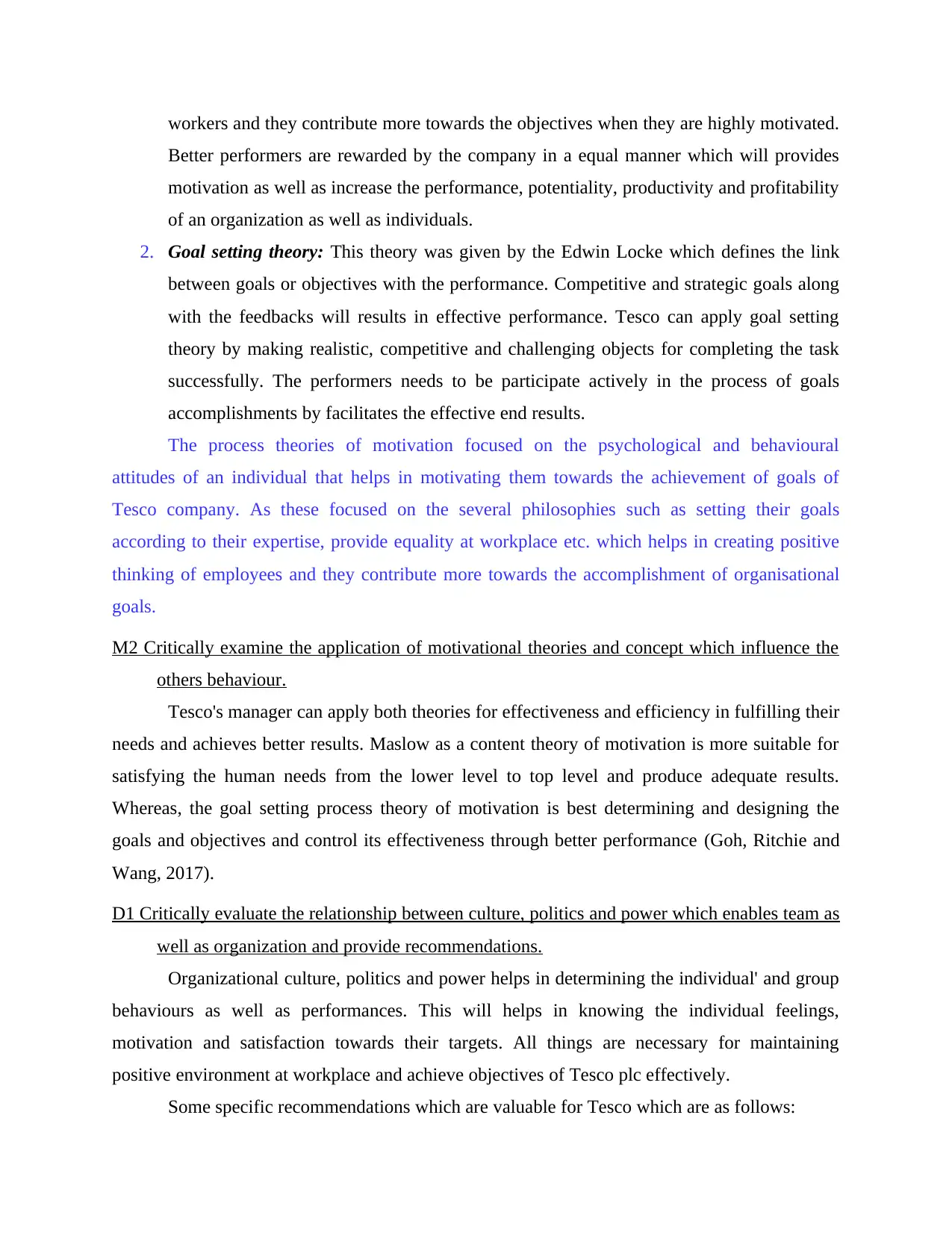
workers and they contribute more towards the objectives when they are highly motivated.
Better performers are rewarded by the company in a equal manner which will provides
motivation as well as increase the performance, potentiality, productivity and profitability
of an organization as well as individuals.
2. Goal setting theory: This theory was given by the Edwin Locke which defines the link
between goals or objectives with the performance. Competitive and strategic goals along
with the feedbacks will results in effective performance. Tesco can apply goal setting
theory by making realistic, competitive and challenging objects for completing the task
successfully. The performers needs to be participate actively in the process of goals
accomplishments by facilitates the effective end results.
The process theories of motivation focused on the psychological and behavioural
attitudes of an individual that helps in motivating them towards the achievement of goals of
Tesco company. As these focused on the several philosophies such as setting their goals
according to their expertise, provide equality at workplace etc. which helps in creating positive
thinking of employees and they contribute more towards the accomplishment of organisational
goals.
M2 Critically examine the application of motivational theories and concept which influence the
others behaviour.
Tesco's manager can apply both theories for effectiveness and efficiency in fulfilling their
needs and achieves better results. Maslow as a content theory of motivation is more suitable for
satisfying the human needs from the lower level to top level and produce adequate results.
Whereas, the goal setting process theory of motivation is best determining and designing the
goals and objectives and control its effectiveness through better performance (Goh, Ritchie and
Wang, 2017).
D1 Critically evaluate the relationship between culture, politics and power which enables team as
well as organization and provide recommendations.
Organizational culture, politics and power helps in determining the individual' and group
behaviours as well as performances. This will helps in knowing the individual feelings,
motivation and satisfaction towards their targets. All things are necessary for maintaining
positive environment at workplace and achieve objectives of Tesco plc effectively.
Some specific recommendations which are valuable for Tesco which are as follows:
Better performers are rewarded by the company in a equal manner which will provides
motivation as well as increase the performance, potentiality, productivity and profitability
of an organization as well as individuals.
2. Goal setting theory: This theory was given by the Edwin Locke which defines the link
between goals or objectives with the performance. Competitive and strategic goals along
with the feedbacks will results in effective performance. Tesco can apply goal setting
theory by making realistic, competitive and challenging objects for completing the task
successfully. The performers needs to be participate actively in the process of goals
accomplishments by facilitates the effective end results.
The process theories of motivation focused on the psychological and behavioural
attitudes of an individual that helps in motivating them towards the achievement of goals of
Tesco company. As these focused on the several philosophies such as setting their goals
according to their expertise, provide equality at workplace etc. which helps in creating positive
thinking of employees and they contribute more towards the accomplishment of organisational
goals.
M2 Critically examine the application of motivational theories and concept which influence the
others behaviour.
Tesco's manager can apply both theories for effectiveness and efficiency in fulfilling their
needs and achieves better results. Maslow as a content theory of motivation is more suitable for
satisfying the human needs from the lower level to top level and produce adequate results.
Whereas, the goal setting process theory of motivation is best determining and designing the
goals and objectives and control its effectiveness through better performance (Goh, Ritchie and
Wang, 2017).
D1 Critically evaluate the relationship between culture, politics and power which enables team as
well as organization and provide recommendations.
Organizational culture, politics and power helps in determining the individual' and group
behaviours as well as performances. This will helps in knowing the individual feelings,
motivation and satisfaction towards their targets. All things are necessary for maintaining
positive environment at workplace and achieve objectives of Tesco plc effectively.
Some specific recommendations which are valuable for Tesco which are as follows:
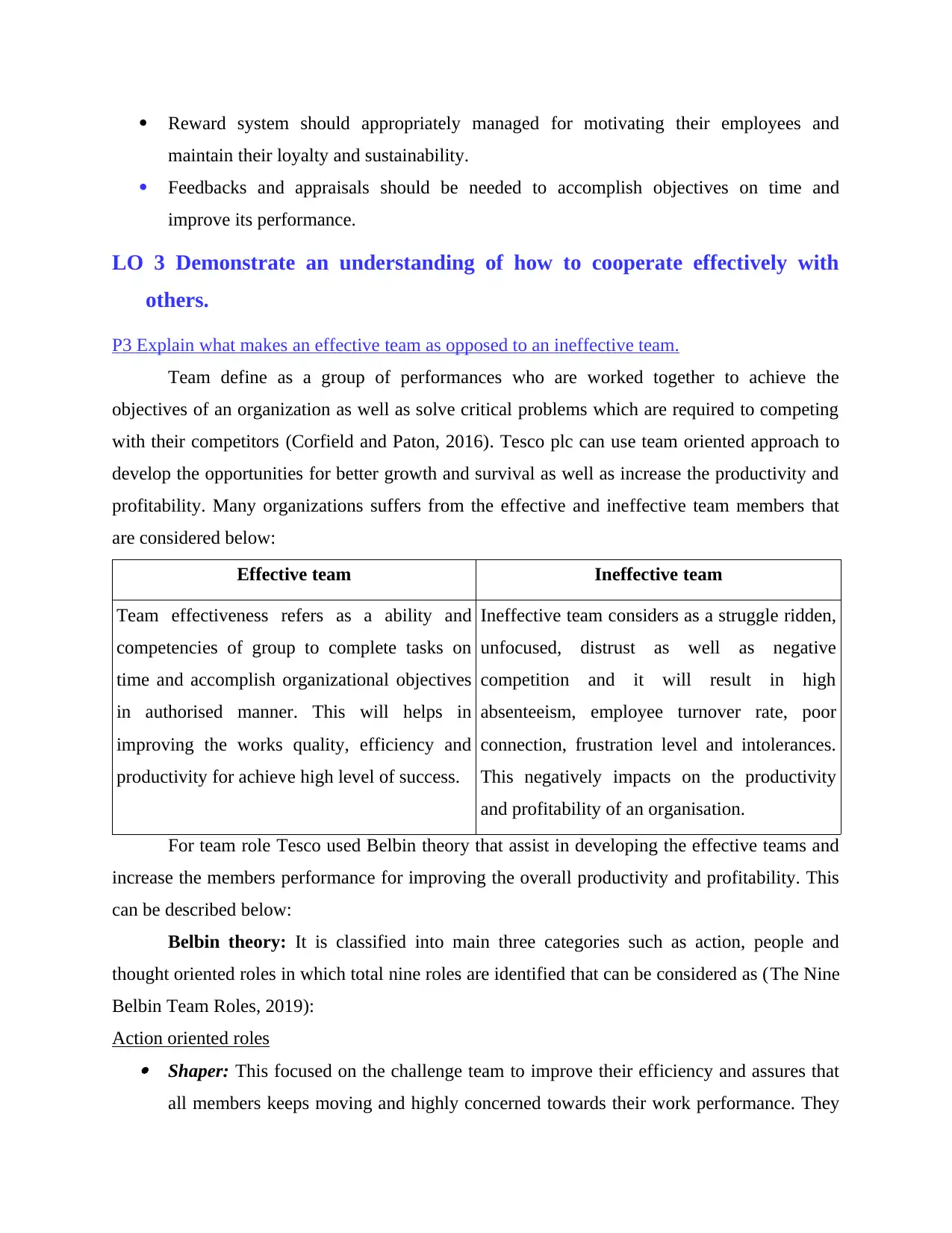
Reward system should appropriately managed for motivating their employees and
maintain their loyalty and sustainability.
Feedbacks and appraisals should be needed to accomplish objectives on time and
improve its performance.
LO 3 Demonstrate an understanding of how to cooperate effectively with
others.
P3 Explain what makes an effective team as opposed to an ineffective team.
Team define as a group of performances who are worked together to achieve the
objectives of an organization as well as solve critical problems which are required to competing
with their competitors (Corfield and Paton, 2016). Tesco plc can use team oriented approach to
develop the opportunities for better growth and survival as well as increase the productivity and
profitability. Many organizations suffers from the effective and ineffective team members that
are considered below:
Effective team Ineffective team
Team effectiveness refers as a ability and
competencies of group to complete tasks on
time and accomplish organizational objectives
in authorised manner. This will helps in
improving the works quality, efficiency and
productivity for achieve high level of success.
Ineffective team considers as a struggle ridden,
unfocused, distrust as well as negative
competition and it will result in high
absenteeism, employee turnover rate, poor
connection, frustration level and intolerances.
This negatively impacts on the productivity
and profitability of an organisation.
For team role Tesco used Belbin theory that assist in developing the effective teams and
increase the members performance for improving the overall productivity and profitability. This
can be described below:
Belbin theory: It is classified into main three categories such as action, people and
thought oriented roles in which total nine roles are identified that can be considered as (The Nine
Belbin Team Roles, 2019):
Action oriented roles Shaper: This focused on the challenge team to improve their efficiency and assures that
all members keeps moving and highly concerned towards their work performance. They
maintain their loyalty and sustainability.
Feedbacks and appraisals should be needed to accomplish objectives on time and
improve its performance.
LO 3 Demonstrate an understanding of how to cooperate effectively with
others.
P3 Explain what makes an effective team as opposed to an ineffective team.
Team define as a group of performances who are worked together to achieve the
objectives of an organization as well as solve critical problems which are required to competing
with their competitors (Corfield and Paton, 2016). Tesco plc can use team oriented approach to
develop the opportunities for better growth and survival as well as increase the productivity and
profitability. Many organizations suffers from the effective and ineffective team members that
are considered below:
Effective team Ineffective team
Team effectiveness refers as a ability and
competencies of group to complete tasks on
time and accomplish organizational objectives
in authorised manner. This will helps in
improving the works quality, efficiency and
productivity for achieve high level of success.
Ineffective team considers as a struggle ridden,
unfocused, distrust as well as negative
competition and it will result in high
absenteeism, employee turnover rate, poor
connection, frustration level and intolerances.
This negatively impacts on the productivity
and profitability of an organisation.
For team role Tesco used Belbin theory that assist in developing the effective teams and
increase the members performance for improving the overall productivity and profitability. This
can be described below:
Belbin theory: It is classified into main three categories such as action, people and
thought oriented roles in which total nine roles are identified that can be considered as (The Nine
Belbin Team Roles, 2019):
Action oriented roles Shaper: This focused on the challenge team to improve their efficiency and assures that
all members keeps moving and highly concerned towards their work performance. They
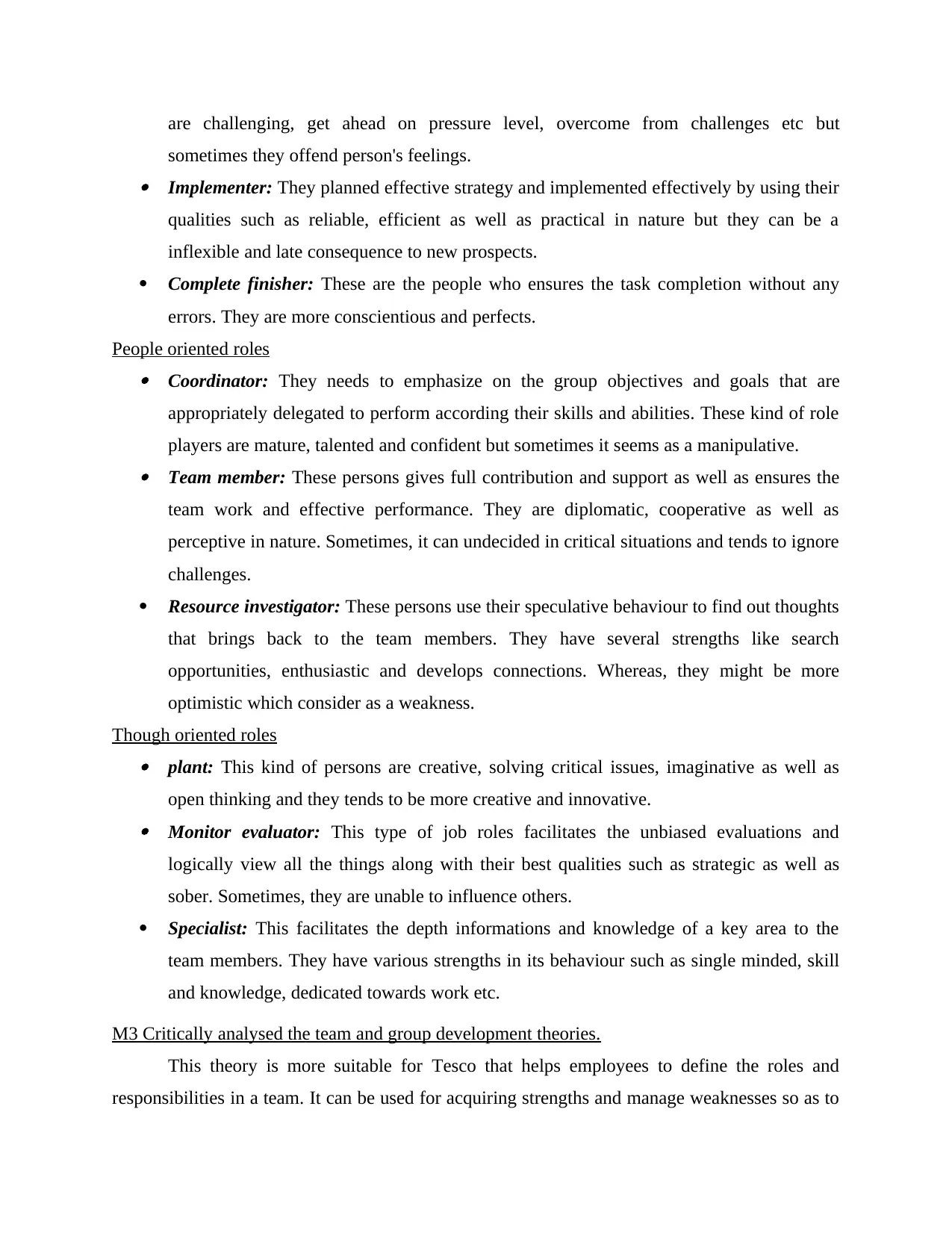
are challenging, get ahead on pressure level, overcome from challenges etc but
sometimes they offend person's feelings. Implementer: They planned effective strategy and implemented effectively by using their
qualities such as reliable, efficient as well as practical in nature but they can be a
inflexible and late consequence to new prospects.
Complete finisher: These are the people who ensures the task completion without any
errors. They are more conscientious and perfects.
People oriented roles Coordinator: They needs to emphasize on the group objectives and goals that are
appropriately delegated to perform according their skills and abilities. These kind of role
players are mature, talented and confident but sometimes it seems as a manipulative. Team member: These persons gives full contribution and support as well as ensures the
team work and effective performance. They are diplomatic, cooperative as well as
perceptive in nature. Sometimes, it can undecided in critical situations and tends to ignore
challenges.
Resource investigator: These persons use their speculative behaviour to find out thoughts
that brings back to the team members. They have several strengths like search
opportunities, enthusiastic and develops connections. Whereas, they might be more
optimistic which consider as a weakness.
Though oriented roles plant: This kind of persons are creative, solving critical issues, imaginative as well as
open thinking and they tends to be more creative and innovative. Monitor evaluator: This type of job roles facilitates the unbiased evaluations and
logically view all the things along with their best qualities such as strategic as well as
sober. Sometimes, they are unable to influence others.
Specialist: This facilitates the depth informations and knowledge of a key area to the
team members. They have various strengths in its behaviour such as single minded, skill
and knowledge, dedicated towards work etc.
M3 Critically analysed the team and group development theories.
This theory is more suitable for Tesco that helps employees to define the roles and
responsibilities in a team. It can be used for acquiring strengths and manage weaknesses so as to
sometimes they offend person's feelings. Implementer: They planned effective strategy and implemented effectively by using their
qualities such as reliable, efficient as well as practical in nature but they can be a
inflexible and late consequence to new prospects.
Complete finisher: These are the people who ensures the task completion without any
errors. They are more conscientious and perfects.
People oriented roles Coordinator: They needs to emphasize on the group objectives and goals that are
appropriately delegated to perform according their skills and abilities. These kind of role
players are mature, talented and confident but sometimes it seems as a manipulative. Team member: These persons gives full contribution and support as well as ensures the
team work and effective performance. They are diplomatic, cooperative as well as
perceptive in nature. Sometimes, it can undecided in critical situations and tends to ignore
challenges.
Resource investigator: These persons use their speculative behaviour to find out thoughts
that brings back to the team members. They have several strengths like search
opportunities, enthusiastic and develops connections. Whereas, they might be more
optimistic which consider as a weakness.
Though oriented roles plant: This kind of persons are creative, solving critical issues, imaginative as well as
open thinking and they tends to be more creative and innovative. Monitor evaluator: This type of job roles facilitates the unbiased evaluations and
logically view all the things along with their best qualities such as strategic as well as
sober. Sometimes, they are unable to influence others.
Specialist: This facilitates the depth informations and knowledge of a key area to the
team members. They have various strengths in its behaviour such as single minded, skill
and knowledge, dedicated towards work etc.
M3 Critically analysed the team and group development theories.
This theory is more suitable for Tesco that helps employees to define the roles and
responsibilities in a team. It can be used for acquiring strengths and manage weaknesses so as to
Secure Best Marks with AI Grader
Need help grading? Try our AI Grader for instant feedback on your assignments.
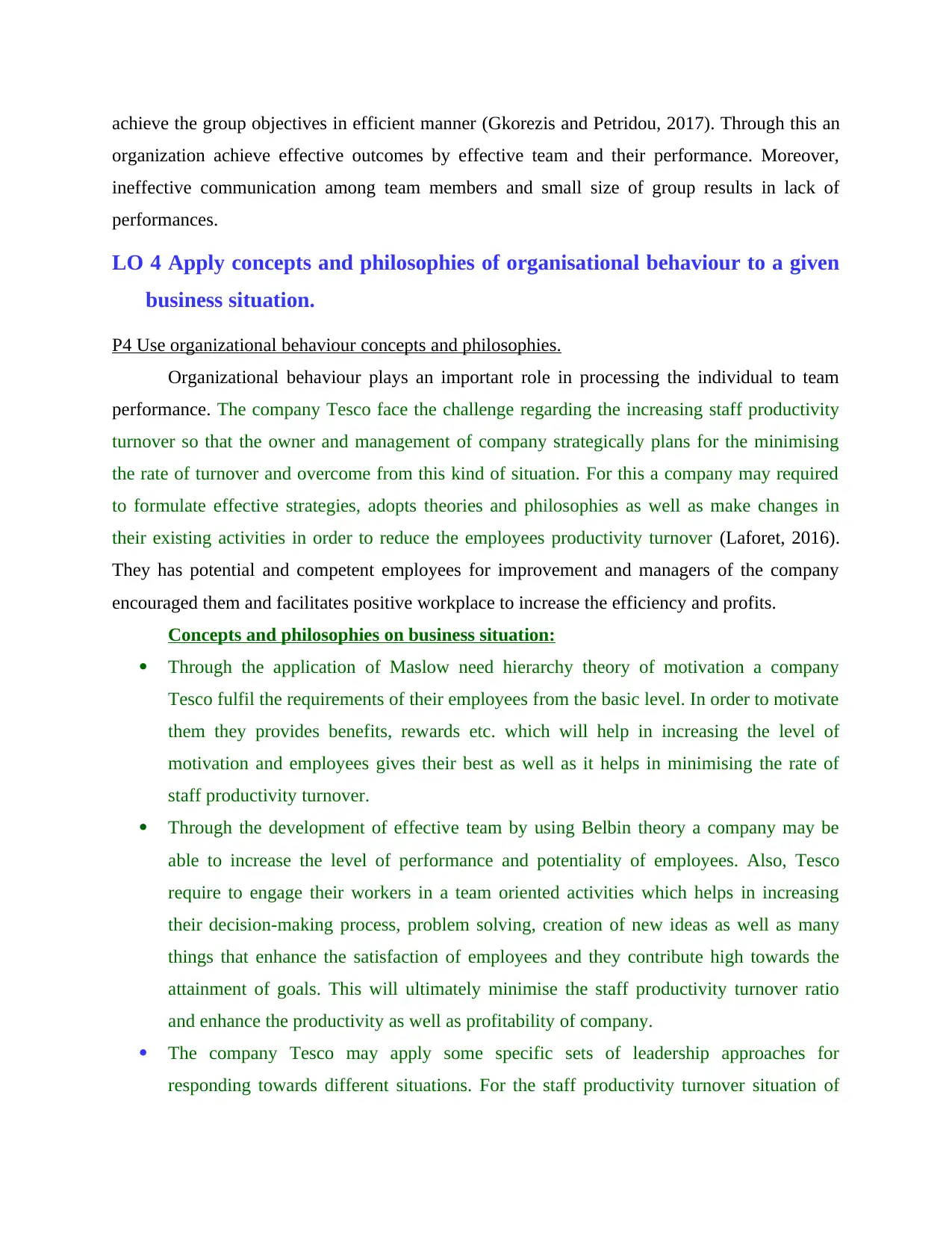
achieve the group objectives in efficient manner (Gkorezis and Petridou, 2017). Through this an
organization achieve effective outcomes by effective team and their performance. Moreover,
ineffective communication among team members and small size of group results in lack of
performances.
LO 4 Apply concepts and philosophies of organisational behaviour to a given
business situation.
P4 Use organizational behaviour concepts and philosophies.
Organizational behaviour plays an important role in processing the individual to team
performance. The company Tesco face the challenge regarding the increasing staff productivity
turnover so that the owner and management of company strategically plans for the minimising
the rate of turnover and overcome from this kind of situation. For this a company may required
to formulate effective strategies, adopts theories and philosophies as well as make changes in
their existing activities in order to reduce the employees productivity turnover (Laforet, 2016).
They has potential and competent employees for improvement and managers of the company
encouraged them and facilitates positive workplace to increase the efficiency and profits.
Concepts and philosophies on business situation:
Through the application of Maslow need hierarchy theory of motivation a company
Tesco fulfil the requirements of their employees from the basic level. In order to motivate
them they provides benefits, rewards etc. which will help in increasing the level of
motivation and employees gives their best as well as it helps in minimising the rate of
staff productivity turnover.
Through the development of effective team by using Belbin theory a company may be
able to increase the level of performance and potentiality of employees. Also, Tesco
require to engage their workers in a team oriented activities which helps in increasing
their decision-making process, problem solving, creation of new ideas as well as many
things that enhance the satisfaction of employees and they contribute high towards the
attainment of goals. This will ultimately minimise the staff productivity turnover ratio
and enhance the productivity as well as profitability of company.
The company Tesco may apply some specific sets of leadership approaches for
responding towards different situations. For the staff productivity turnover situation of
organization achieve effective outcomes by effective team and their performance. Moreover,
ineffective communication among team members and small size of group results in lack of
performances.
LO 4 Apply concepts and philosophies of organisational behaviour to a given
business situation.
P4 Use organizational behaviour concepts and philosophies.
Organizational behaviour plays an important role in processing the individual to team
performance. The company Tesco face the challenge regarding the increasing staff productivity
turnover so that the owner and management of company strategically plans for the minimising
the rate of turnover and overcome from this kind of situation. For this a company may required
to formulate effective strategies, adopts theories and philosophies as well as make changes in
their existing activities in order to reduce the employees productivity turnover (Laforet, 2016).
They has potential and competent employees for improvement and managers of the company
encouraged them and facilitates positive workplace to increase the efficiency and profits.
Concepts and philosophies on business situation:
Through the application of Maslow need hierarchy theory of motivation a company
Tesco fulfil the requirements of their employees from the basic level. In order to motivate
them they provides benefits, rewards etc. which will help in increasing the level of
motivation and employees gives their best as well as it helps in minimising the rate of
staff productivity turnover.
Through the development of effective team by using Belbin theory a company may be
able to increase the level of performance and potentiality of employees. Also, Tesco
require to engage their workers in a team oriented activities which helps in increasing
their decision-making process, problem solving, creation of new ideas as well as many
things that enhance the satisfaction of employees and they contribute high towards the
attainment of goals. This will ultimately minimise the staff productivity turnover ratio
and enhance the productivity as well as profitability of company.
The company Tesco may apply some specific sets of leadership approaches for
responding towards different situations. For the staff productivity turnover situation of
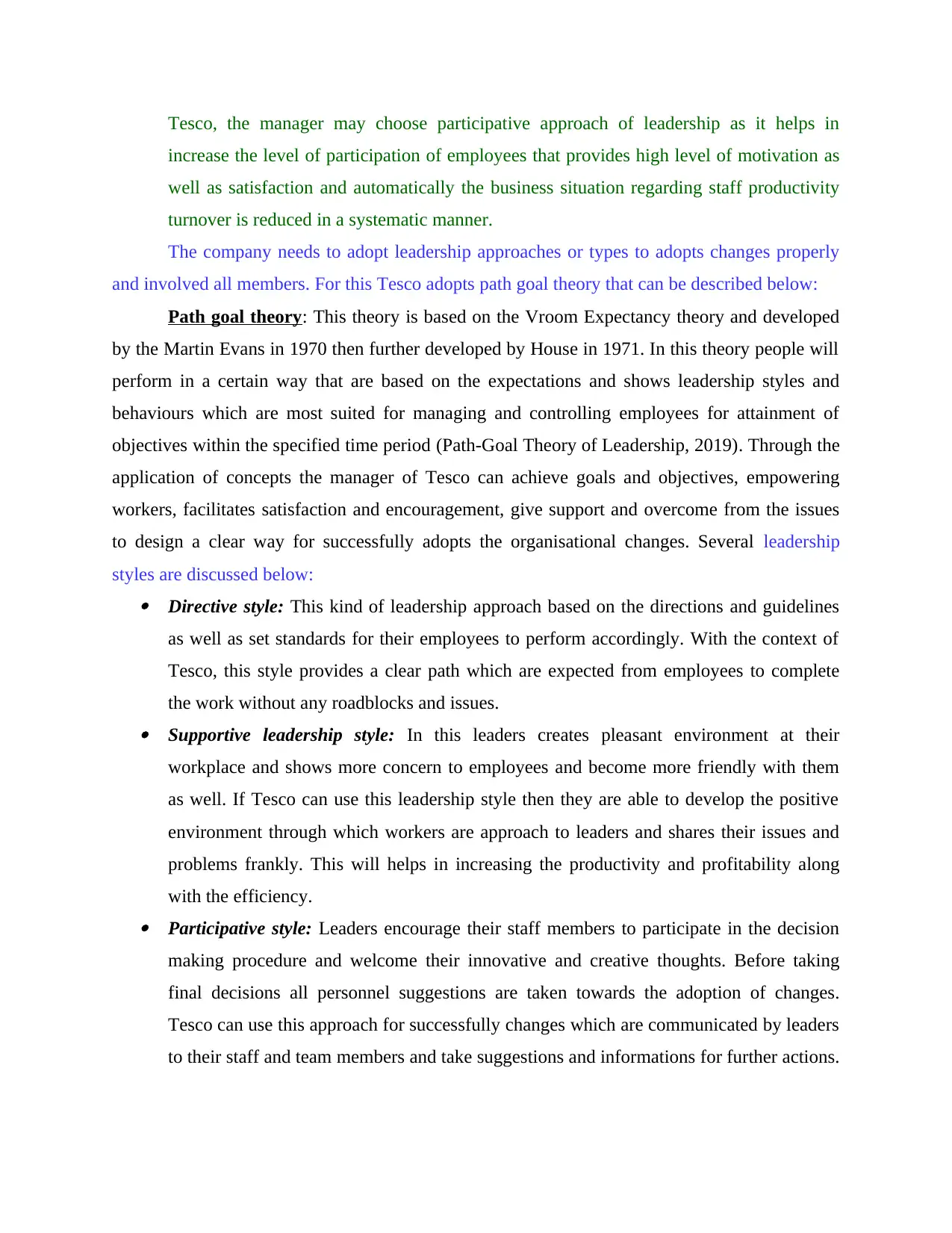
Tesco, the manager may choose participative approach of leadership as it helps in
increase the level of participation of employees that provides high level of motivation as
well as satisfaction and automatically the business situation regarding staff productivity
turnover is reduced in a systematic manner.
The company needs to adopt leadership approaches or types to adopts changes properly
and involved all members. For this Tesco adopts path goal theory that can be described below:
Path goal theory: This theory is based on the Vroom Expectancy theory and developed
by the Martin Evans in 1970 then further developed by House in 1971. In this theory people will
perform in a certain way that are based on the expectations and shows leadership styles and
behaviours which are most suited for managing and controlling employees for attainment of
objectives within the specified time period (Path-Goal Theory of Leadership, 2019). Through the
application of concepts the manager of Tesco can achieve goals and objectives, empowering
workers, facilitates satisfaction and encouragement, give support and overcome from the issues
to design a clear way for successfully adopts the organisational changes. Several leadership
styles are discussed below: Directive style: This kind of leadership approach based on the directions and guidelines
as well as set standards for their employees to perform accordingly. With the context of
Tesco, this style provides a clear path which are expected from employees to complete
the work without any roadblocks and issues. Supportive leadership style: In this leaders creates pleasant environment at their
workplace and shows more concern to employees and become more friendly with them
as well. If Tesco can use this leadership style then they are able to develop the positive
environment through which workers are approach to leaders and shares their issues and
problems frankly. This will helps in increasing the productivity and profitability along
with the efficiency. Participative style: Leaders encourage their staff members to participate in the decision
making procedure and welcome their innovative and creative thoughts. Before taking
final decisions all personnel suggestions are taken towards the adoption of changes.
Tesco can use this approach for successfully changes which are communicated by leaders
to their staff and team members and take suggestions and informations for further actions.
increase the level of participation of employees that provides high level of motivation as
well as satisfaction and automatically the business situation regarding staff productivity
turnover is reduced in a systematic manner.
The company needs to adopt leadership approaches or types to adopts changes properly
and involved all members. For this Tesco adopts path goal theory that can be described below:
Path goal theory: This theory is based on the Vroom Expectancy theory and developed
by the Martin Evans in 1970 then further developed by House in 1971. In this theory people will
perform in a certain way that are based on the expectations and shows leadership styles and
behaviours which are most suited for managing and controlling employees for attainment of
objectives within the specified time period (Path-Goal Theory of Leadership, 2019). Through the
application of concepts the manager of Tesco can achieve goals and objectives, empowering
workers, facilitates satisfaction and encouragement, give support and overcome from the issues
to design a clear way for successfully adopts the organisational changes. Several leadership
styles are discussed below: Directive style: This kind of leadership approach based on the directions and guidelines
as well as set standards for their employees to perform accordingly. With the context of
Tesco, this style provides a clear path which are expected from employees to complete
the work without any roadblocks and issues. Supportive leadership style: In this leaders creates pleasant environment at their
workplace and shows more concern to employees and become more friendly with them
as well. If Tesco can use this leadership style then they are able to develop the positive
environment through which workers are approach to leaders and shares their issues and
problems frankly. This will helps in increasing the productivity and profitability along
with the efficiency. Participative style: Leaders encourage their staff members to participate in the decision
making procedure and welcome their innovative and creative thoughts. Before taking
final decisions all personnel suggestions are taken towards the adoption of changes.
Tesco can use this approach for successfully changes which are communicated by leaders
to their staff and team members and take suggestions and informations for further actions.
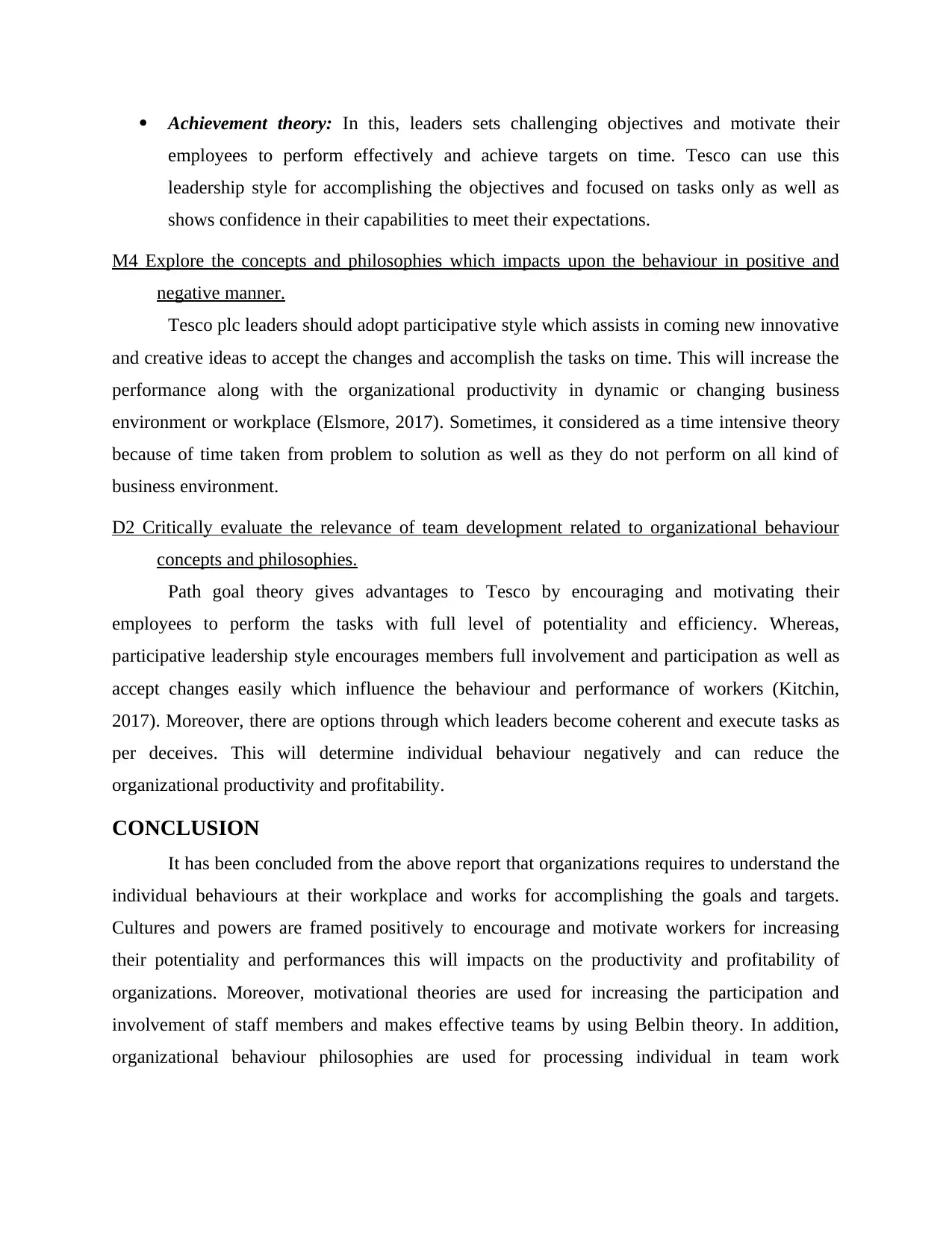
Achievement theory: In this, leaders sets challenging objectives and motivate their
employees to perform effectively and achieve targets on time. Tesco can use this
leadership style for accomplishing the objectives and focused on tasks only as well as
shows confidence in their capabilities to meet their expectations.
M4 Explore the concepts and philosophies which impacts upon the behaviour in positive and
negative manner.
Tesco plc leaders should adopt participative style which assists in coming new innovative
and creative ideas to accept the changes and accomplish the tasks on time. This will increase the
performance along with the organizational productivity in dynamic or changing business
environment or workplace (Elsmore, 2017). Sometimes, it considered as a time intensive theory
because of time taken from problem to solution as well as they do not perform on all kind of
business environment.
D2 Critically evaluate the relevance of team development related to organizational behaviour
concepts and philosophies.
Path goal theory gives advantages to Tesco by encouraging and motivating their
employees to perform the tasks with full level of potentiality and efficiency. Whereas,
participative leadership style encourages members full involvement and participation as well as
accept changes easily which influence the behaviour and performance of workers (Kitchin,
2017). Moreover, there are options through which leaders become coherent and execute tasks as
per deceives. This will determine individual behaviour negatively and can reduce the
organizational productivity and profitability.
CONCLUSION
It has been concluded from the above report that organizations requires to understand the
individual behaviours at their workplace and works for accomplishing the goals and targets.
Cultures and powers are framed positively to encourage and motivate workers for increasing
their potentiality and performances this will impacts on the productivity and profitability of
organizations. Moreover, motivational theories are used for increasing the participation and
involvement of staff members and makes effective teams by using Belbin theory. In addition,
organizational behaviour philosophies are used for processing individual in team work
employees to perform effectively and achieve targets on time. Tesco can use this
leadership style for accomplishing the objectives and focused on tasks only as well as
shows confidence in their capabilities to meet their expectations.
M4 Explore the concepts and philosophies which impacts upon the behaviour in positive and
negative manner.
Tesco plc leaders should adopt participative style which assists in coming new innovative
and creative ideas to accept the changes and accomplish the tasks on time. This will increase the
performance along with the organizational productivity in dynamic or changing business
environment or workplace (Elsmore, 2017). Sometimes, it considered as a time intensive theory
because of time taken from problem to solution as well as they do not perform on all kind of
business environment.
D2 Critically evaluate the relevance of team development related to organizational behaviour
concepts and philosophies.
Path goal theory gives advantages to Tesco by encouraging and motivating their
employees to perform the tasks with full level of potentiality and efficiency. Whereas,
participative leadership style encourages members full involvement and participation as well as
accept changes easily which influence the behaviour and performance of workers (Kitchin,
2017). Moreover, there are options through which leaders become coherent and execute tasks as
per deceives. This will determine individual behaviour negatively and can reduce the
organizational productivity and profitability.
CONCLUSION
It has been concluded from the above report that organizations requires to understand the
individual behaviours at their workplace and works for accomplishing the goals and targets.
Cultures and powers are framed positively to encourage and motivate workers for increasing
their potentiality and performances this will impacts on the productivity and profitability of
organizations. Moreover, motivational theories are used for increasing the participation and
involvement of staff members and makes effective teams by using Belbin theory. In addition,
organizational behaviour philosophies are used for processing individual in team work
Paraphrase This Document
Need a fresh take? Get an instant paraphrase of this document with our AI Paraphraser
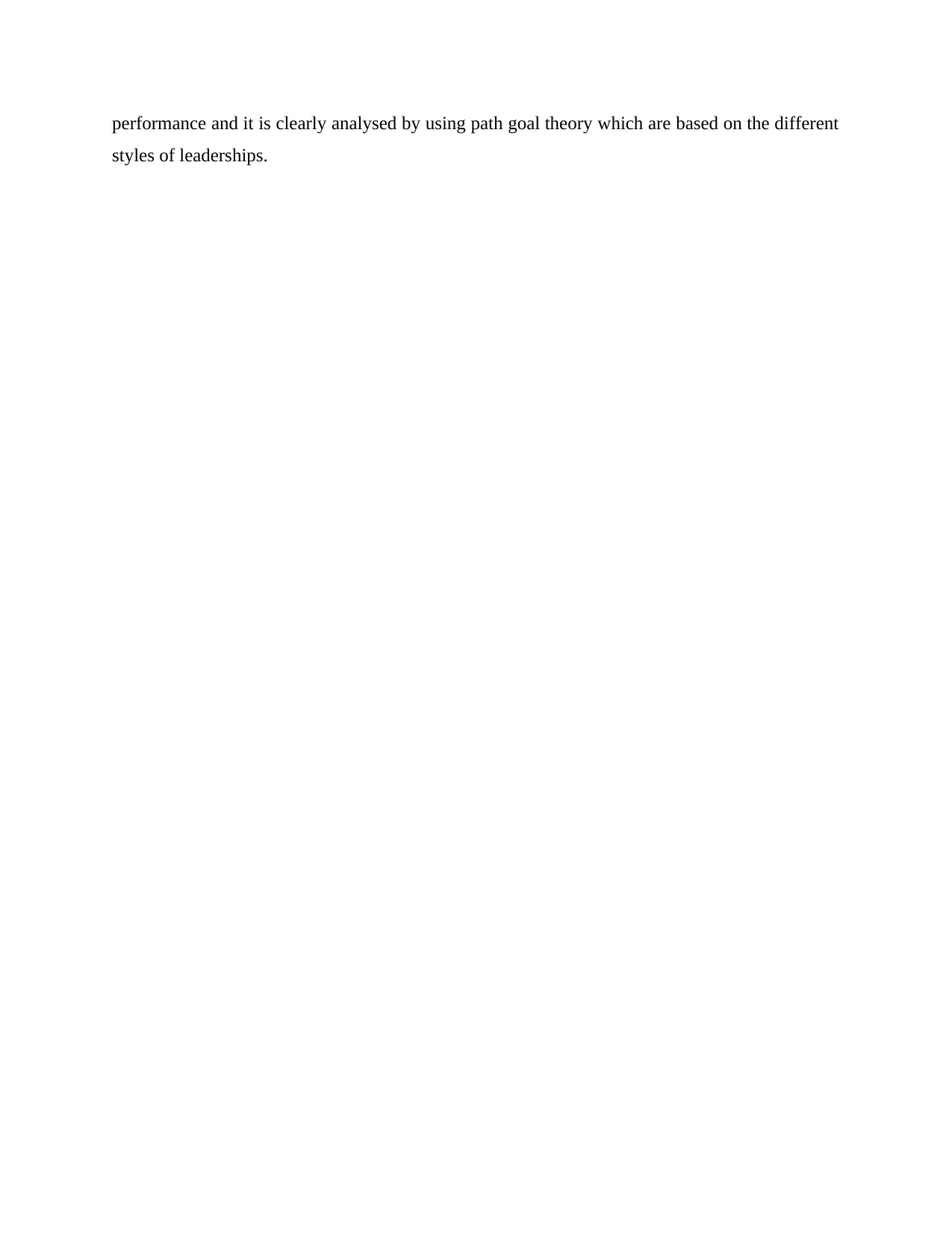
performance and it is clearly analysed by using path goal theory which are based on the different
styles of leaderships.
styles of leaderships.
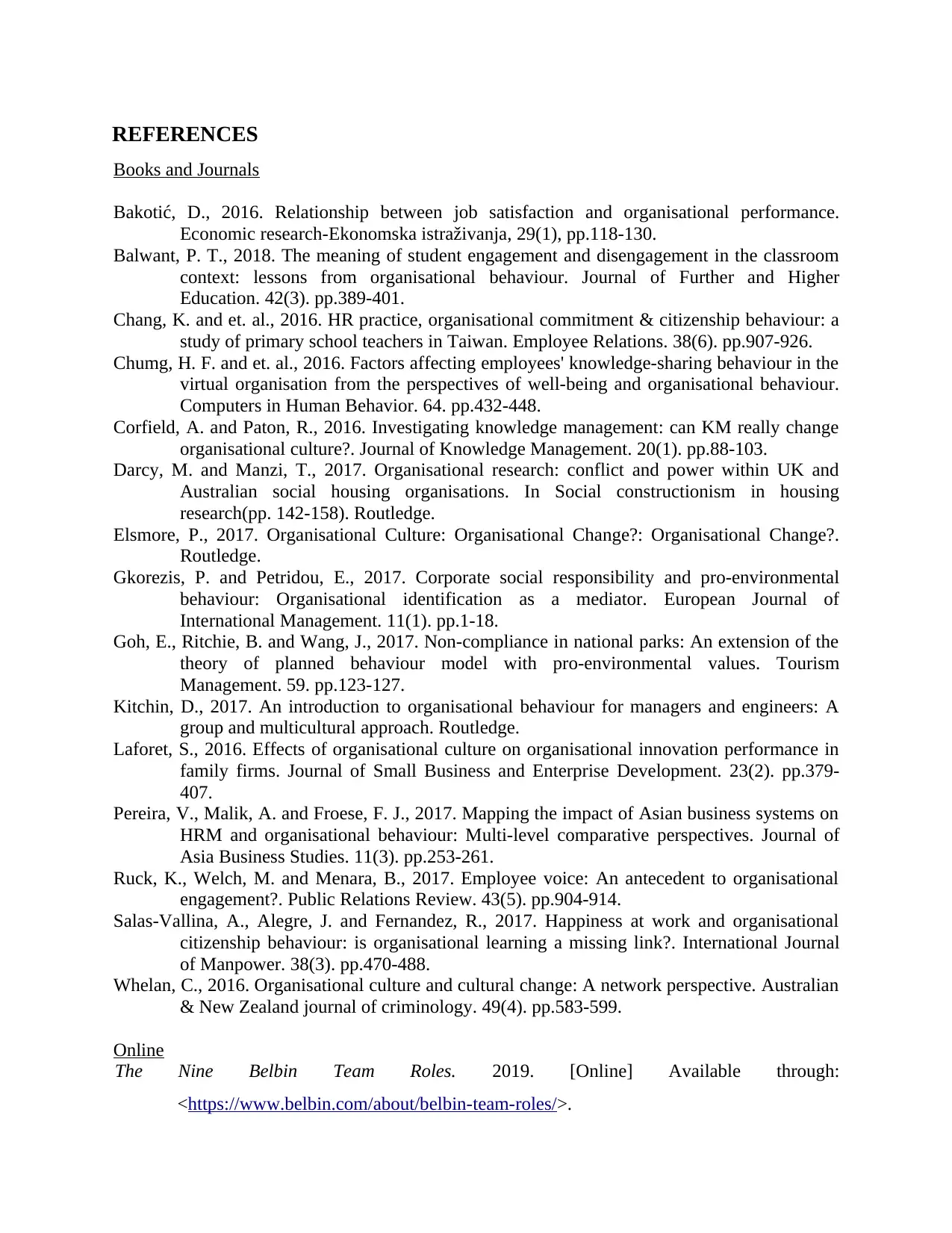
REFERENCES
Books and Journals
Bakotić, D., 2016. Relationship between job satisfaction and organisational performance.
Economic research-Ekonomska istraživanja, 29(1), pp.118-130.
Balwant, P. T., 2018. The meaning of student engagement and disengagement in the classroom
context: lessons from organisational behaviour. Journal of Further and Higher
Education. 42(3). pp.389-401.
Chang, K. and et. al., 2016. HR practice, organisational commitment & citizenship behaviour: a
study of primary school teachers in Taiwan. Employee Relations. 38(6). pp.907-926.
Chumg, H. F. and et. al., 2016. Factors affecting employees' knowledge-sharing behaviour in the
virtual organisation from the perspectives of well-being and organisational behaviour.
Computers in Human Behavior. 64. pp.432-448.
Corfield, A. and Paton, R., 2016. Investigating knowledge management: can KM really change
organisational culture?. Journal of Knowledge Management. 20(1). pp.88-103.
Darcy, M. and Manzi, T., 2017. Organisational research: conflict and power within UK and
Australian social housing organisations. In Social constructionism in housing
research(pp. 142-158). Routledge.
Elsmore, P., 2017. Organisational Culture: Organisational Change?: Organisational Change?.
Routledge.
Gkorezis, P. and Petridou, E., 2017. Corporate social responsibility and pro-environmental
behaviour: Organisational identification as a mediator. European Journal of
International Management. 11(1). pp.1-18.
Goh, E., Ritchie, B. and Wang, J., 2017. Non-compliance in national parks: An extension of the
theory of planned behaviour model with pro-environmental values. Tourism
Management. 59. pp.123-127.
Kitchin, D., 2017. An introduction to organisational behaviour for managers and engineers: A
group and multicultural approach. Routledge.
Laforet, S., 2016. Effects of organisational culture on organisational innovation performance in
family firms. Journal of Small Business and Enterprise Development. 23(2). pp.379-
407.
Pereira, V., Malik, A. and Froese, F. J., 2017. Mapping the impact of Asian business systems on
HRM and organisational behaviour: Multi-level comparative perspectives. Journal of
Asia Business Studies. 11(3). pp.253-261.
Ruck, K., Welch, M. and Menara, B., 2017. Employee voice: An antecedent to organisational
engagement?. Public Relations Review. 43(5). pp.904-914.
Salas-Vallina, A., Alegre, J. and Fernandez, R., 2017. Happiness at work and organisational
citizenship behaviour: is organisational learning a missing link?. International Journal
of Manpower. 38(3). pp.470-488.
Whelan, C., 2016. Organisational culture and cultural change: A network perspective. Australian
& New Zealand journal of criminology. 49(4). pp.583-599.
Online
The Nine Belbin Team Roles. 2019. [Online] Available through:
<https://www.belbin.com/about/belbin-team-roles/>.
Books and Journals
Bakotić, D., 2016. Relationship between job satisfaction and organisational performance.
Economic research-Ekonomska istraživanja, 29(1), pp.118-130.
Balwant, P. T., 2018. The meaning of student engagement and disengagement in the classroom
context: lessons from organisational behaviour. Journal of Further and Higher
Education. 42(3). pp.389-401.
Chang, K. and et. al., 2016. HR practice, organisational commitment & citizenship behaviour: a
study of primary school teachers in Taiwan. Employee Relations. 38(6). pp.907-926.
Chumg, H. F. and et. al., 2016. Factors affecting employees' knowledge-sharing behaviour in the
virtual organisation from the perspectives of well-being and organisational behaviour.
Computers in Human Behavior. 64. pp.432-448.
Corfield, A. and Paton, R., 2016. Investigating knowledge management: can KM really change
organisational culture?. Journal of Knowledge Management. 20(1). pp.88-103.
Darcy, M. and Manzi, T., 2017. Organisational research: conflict and power within UK and
Australian social housing organisations. In Social constructionism in housing
research(pp. 142-158). Routledge.
Elsmore, P., 2017. Organisational Culture: Organisational Change?: Organisational Change?.
Routledge.
Gkorezis, P. and Petridou, E., 2017. Corporate social responsibility and pro-environmental
behaviour: Organisational identification as a mediator. European Journal of
International Management. 11(1). pp.1-18.
Goh, E., Ritchie, B. and Wang, J., 2017. Non-compliance in national parks: An extension of the
theory of planned behaviour model with pro-environmental values. Tourism
Management. 59. pp.123-127.
Kitchin, D., 2017. An introduction to organisational behaviour for managers and engineers: A
group and multicultural approach. Routledge.
Laforet, S., 2016. Effects of organisational culture on organisational innovation performance in
family firms. Journal of Small Business and Enterprise Development. 23(2). pp.379-
407.
Pereira, V., Malik, A. and Froese, F. J., 2017. Mapping the impact of Asian business systems on
HRM and organisational behaviour: Multi-level comparative perspectives. Journal of
Asia Business Studies. 11(3). pp.253-261.
Ruck, K., Welch, M. and Menara, B., 2017. Employee voice: An antecedent to organisational
engagement?. Public Relations Review. 43(5). pp.904-914.
Salas-Vallina, A., Alegre, J. and Fernandez, R., 2017. Happiness at work and organisational
citizenship behaviour: is organisational learning a missing link?. International Journal
of Manpower. 38(3). pp.470-488.
Whelan, C., 2016. Organisational culture and cultural change: A network perspective. Australian
& New Zealand journal of criminology. 49(4). pp.583-599.
Online
The Nine Belbin Team Roles. 2019. [Online] Available through:
<https://www.belbin.com/about/belbin-team-roles/>.
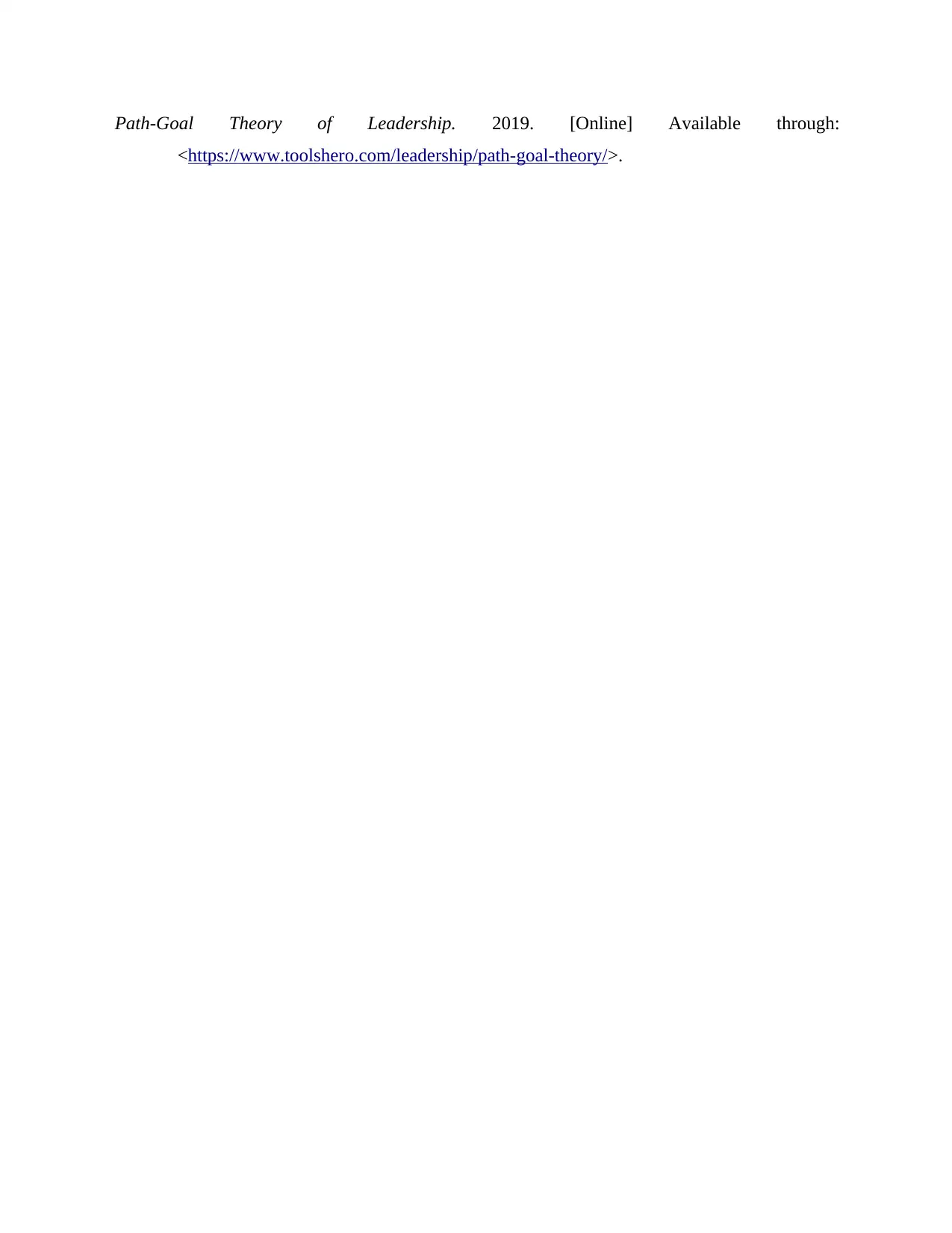
Path-Goal Theory of Leadership. 2019. [Online] Available through:
<https://www.toolshero.com/leadership/path-goal-theory/>.
<https://www.toolshero.com/leadership/path-goal-theory/>.
1 out of 16
Related Documents
Your All-in-One AI-Powered Toolkit for Academic Success.
+13062052269
info@desklib.com
Available 24*7 on WhatsApp / Email
![[object Object]](/_next/static/media/star-bottom.7253800d.svg)
Unlock your academic potential
© 2024 | Zucol Services PVT LTD | All rights reserved.





